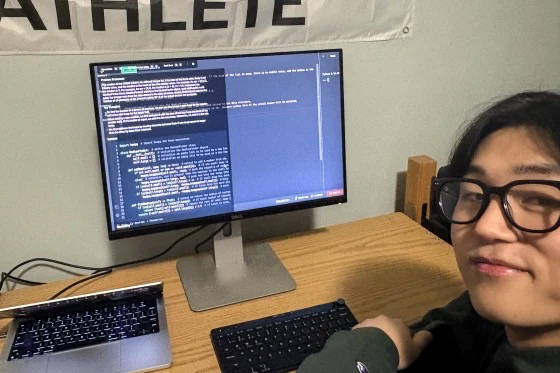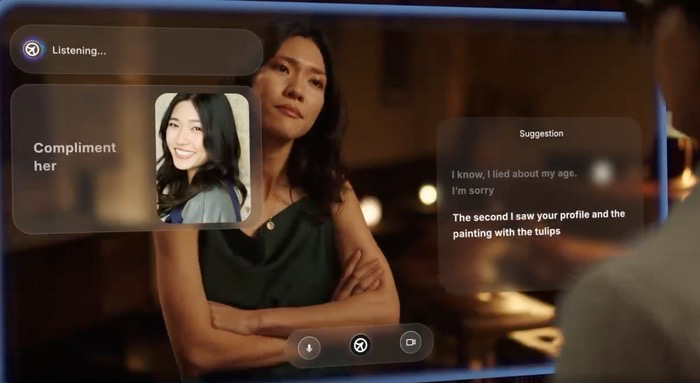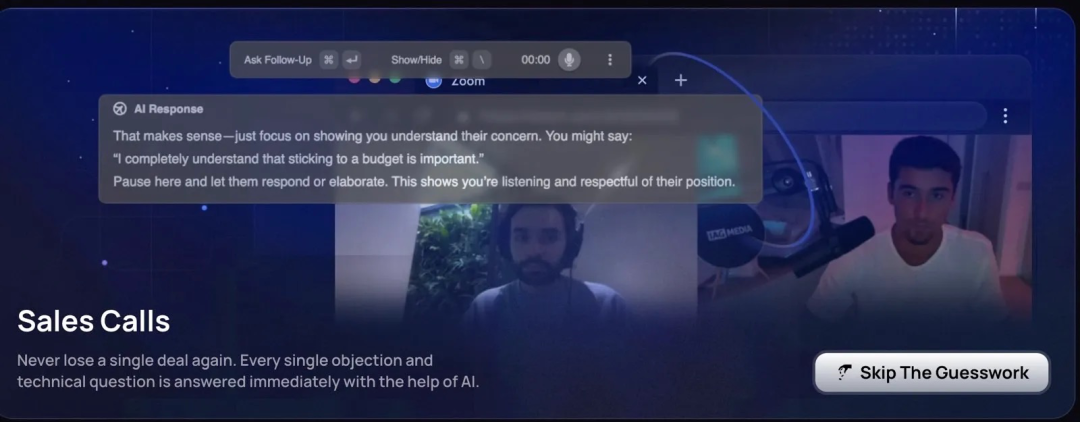21-Year-Old Entrepreneur Raises $5.3 Million After Columbia University Expulsion Over 'Cheating Tool'
![]() 04/28 2025
04/28 2025
![]() 525
525


Author | Lexie, Editor | Ivan
Last weekend, Columbia University officially decided to suspend the academic eligibility of 21-year-old student Chungin "Roy" Lee. The reason was straightforward: he and his partner Neel Shanmugam developed a tool capable of real-time cheating during technical interviews, which the university deemed a breach of academic integrity.
However, before the punishment was finalized, Roy Lee shared another significant news: his startup Cluely had just secured a $5.3 million seed funding round, co-led by Abstract Ventures and Susa Ventures. This time, he aims to transform the tool, originally designed for "interview cheating," into a commercial system that can "aid in various scenarios" during sales negotiations and remote meetings.

From a campus cheating tool to millions in funding
Cluely's initial prototype was Interview Coder, a small tool specifically developed to bypass LeetCode technical interviews. Lee and Shanmugam did not shy away from their original intention, expressing dissatisfaction with the LeetCode interview process, which they deemed unreasonable. LeetCode is an online platform for coding interview preparation, providing coding and algorithm problems for users to practice. However, Lee and Shanmugam believed that rote memorization of algorithm problems could not reflect the actual work capabilities of software engineers.
Interview Coder was not technically complex: it captured questions in real-time through an invisible browser window, leveraged a large model in the background to generate answers, and transmitted them back to the user with low latency, making it difficult for interviewers to detect even during screen sharing.

With this system, Lee successfully secured internship opportunities at tech giants such as Amazon, Meta, TikTok, and Capital One.
Subsequently, Lee shared his experience of using the tool to pass the Amazon interview on platform X, which quickly garnered widespread attention. Notably, an Amazon executive noticed the post and directly contacted Columbia University, ultimately leading to Lee's suspension. Lee then publicly shared Columbia's punishment letter, turning the topic of "AI cheating tools" into an overnight sensation on social media.
This unexpected exposure turned out to be the best marketing for Cluely. After the punishment letter was made public, Cluely's website traffic surged, and the number of registered users climbed rapidly. The controversy became the best publicity and laid the foundation for subsequent funding negotiations.
Amidst the ongoing public opinion, Lee and Shanmugam decided to abandon their studies and focus full-time on founding Cluely, systematizing and commercializing the tool, and expanding its application scenarios from technical interviews to various high-pressure testing situations.

Cluely: The invisible AI assistant hidden in the browser
Today, Cluely has far surpassed its original form as Interview Coder. It is essentially a desktop assistant that operates through an invisible window hidden within the browser, supporting users in receiving AI-generated optimal responses in real-time during interviews, exams, and client interactions.
Specifically, Cluely covers the following usage scenarios:
• Technical/non-technical interviews
• Online exams and quizzes
• Sales calls and business negotiations
• Impromptu responses in remote meetings
In its official introduction, Cluely emphasizes "Invisibility" and "real-time," not only because the interface is invisible but also because the response time is optimized to provide structured and naturally phrased answers within seconds. Lee revealed that Cluely has already achieved over $3 million in annual recurring revenue (ARR) and is showing strong growth momentum.
On Cluely's official website, the company released a statement comparing itself to technological products once viewed as "cheating tools": "Calculators, spell checkers, Google, were all criticized as cheating tools when they first emerged. But today, no one questions the legitimacy of using them. AI is just the next inevitability."

The statement questioned the value of traditional learning methods, emphasizing that in the era of AI, the ability to ask questions may be more important than memorizing knowledge. Cluely embraces this view as the core concept of its product positioning, attempting to redefine people's cognitive boundaries between "cheating" and "auxiliary tools".
To announce Cluely's rebranding from Interview Coder, Lee released a well-produced but controversial promotional video. In the video, Lee uses Cluely's hidden AI assistant to lie about his age and pretend to know about art while on a date in an upscale restaurant. This marketing video sparked polarized reactions on social media, with some comparing it to a "Black Mirror" episode, criticizing it for promoting dishonesty in human interactions. One user on platform X bluntly stated: "Cluely shows us the future of lying."
From a technical perspective, Cluely's core lies in its stealth and real-time capabilities. It adopts an embedded hidden window design within the browser, making it undetectable even in screen-sharing states, while integrating high-performance language models to ensure quick responses. Users can receive AI-generated content through hidden text windows or voice prompts, adapting to various scenarios from programming tests to sales negotiations.
Recently, Cluely announced a system update to achieve "maximum undetectability," further reinforcing its core selling point. This strategy of combining controversial marketing with precise technical implementation is the carefully designed business path of Lee and Shanmugam: first develop the tool and verify its effectiveness in interviews at top tech companies, then use the "shock effect" to spark discussions, ultimately converting them into product attention and user growth.

Innovation or Deception? Cluely's Rebellious Bet
The emergence of Cluely has sparked widespread controversy, with differing focal points of debate ranging from education to the tech industry, and from an ethical perspective to legal dimensions.
Supporters argue that:
• The traditional examination and interview system is outdated, and Cluely merely exposes its ineffectiveness.
• The tool prompts people to rethink the definition of "ability" - memory and mechanical operations may have long been superseded by the ability to ask questions and integrate information.
• Capital market support and user willingness to pay indicate a real demand.
Critics warn that:
• AI educators like Christ First point out that Cluely's popularity may undermine the integrity-based selection system.
• Legal experts remind that using Cluely during video calls involves recording and processing data, which may violate privacy laws or company policies requiring consent.
• Entrepreneurship mentor Dave Craige questions the ethics of building a business around "cheating," bluntly asking, "Do you have any ethics?"
Amazon has made it clear that job applicants must agree not to use unauthorized tools during interviews, highlighting the risks that Cluely users may face. As more companies and educational institutions take measures to combat such tools, Cluely's long-term development path is bound to be fraught with challenges.

In response to these questions, the Cluely team chose a somewhat ironic self-positioning: they are not promoting "cheating" but facilitating the evolution of the evaluation system. From a certain perspective, Cluely does reveal a real problem: when AI can easily pass traditional exams and interviews, do these evaluation methods still hold meaning? The founders and investors of Cluely seem to be betting on a hypothesis: as AI tools become more prevalent, education and recruitment systems will eventually shift, transitioning from testing memorized knowledge to assessing creative thinking and problem-solving abilities. In this transition, tools like Cluely may evolve from "cheating" to "assistance," just as calculators did from being taboo in math exams to becoming standard tools.
This transformation path has precedents in the AI field. Code-assisting tools like GitHub Copilot are gradually being accepted by schools and enterprises. Many AI tools initially viewed as potentially degrading programming abilities are now part of developers' standard toolkits. Similarly, the application of AI writing assistance tools in academia is also undergoing a transformation from controversy to partial acceptance.
Currently based in San Francisco, Cluely has secured support from the capital market, but its path to expansion still faces multiple risks, including bans from schools and recruitment platforms, compliance pressures from stricter privacy regulations, and reputational risks due to fluctuations in public opinion.
At the same time, they may also explore more legitimate territories, such as vocational skills training, soft communication coaching, interview coaching, and other new directions, thereby gradually shedding the label of "cheating tool".







